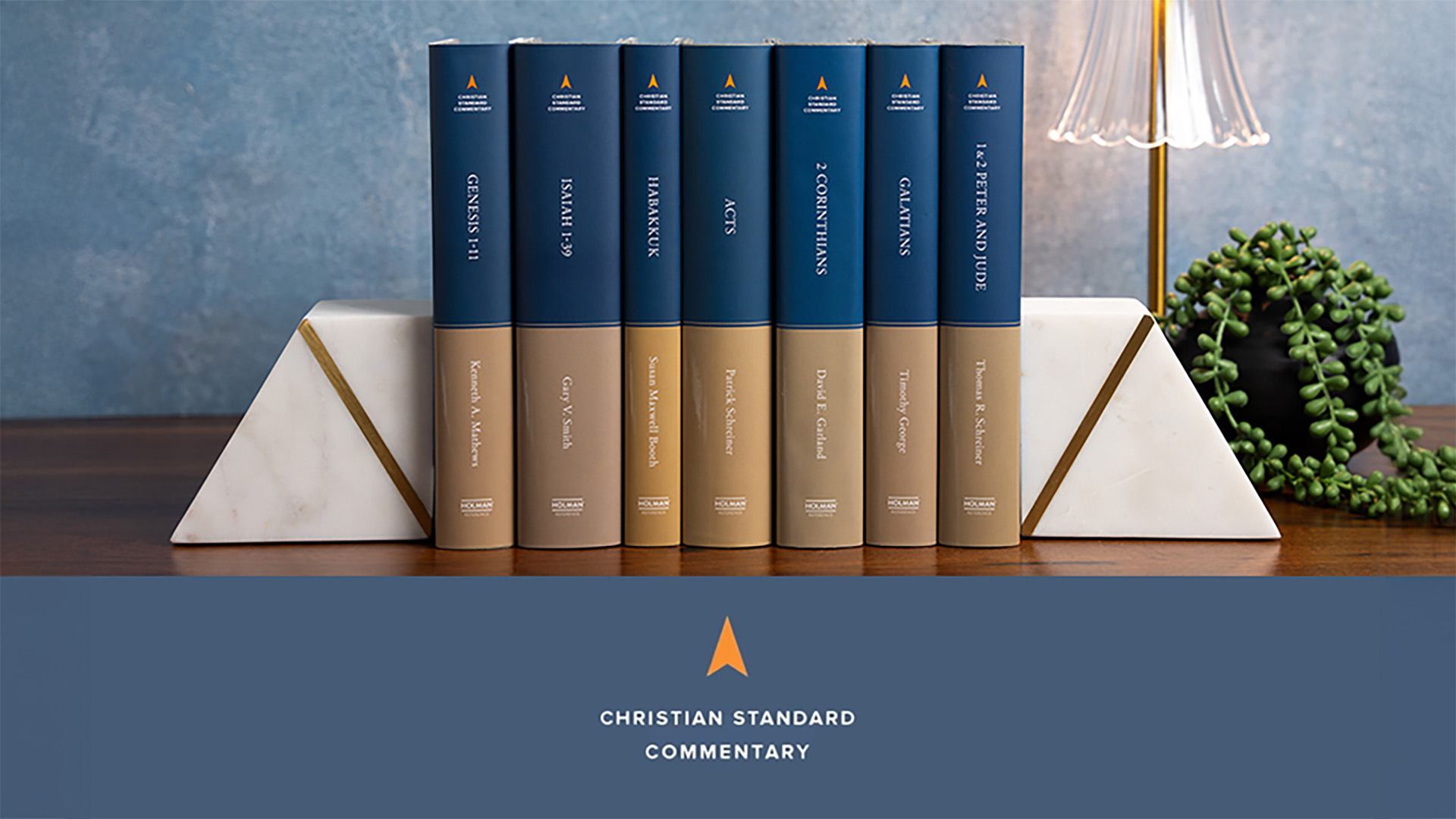This week the blog is sponsored by Lifeway, with the Christian Standard Commentary. Get 40% off on Lifeway.com when you use the promo code CHALLIESCSC40 after putting items into your cart. Does not apply to eBooks or pre-orders.
With the availability of so many great commentaries on the Bible, what sets the Christian Standard Commentary (CSC) apart from others? The CSC aims to embody an “ancient-modern” approach to each volume in the series. This approach seeks to balance the strengths of the modern commentary tradition with the lesser known, and highly beneficial, dynamics of the ancient commentary tradition, bringing together the old and new to give a biblically derived and theologically rich commentary steeped in history.
The modern commentary tradition arose and grew rapidly during and after the Protestant Reformation (ca. 1517–1600). The growth of the biblical commentary tradition is largely a result of three factors:
(1) The recovery of classical learning in the fifteenth and sixteenth centuries. This retrieval led to a revival of interest in the biblical languages (Hebrew, Aramaic, and Greek). Biblical scholars, pastors, and teachers interpreted Scripture based on the biblical languages rather than the Latin Vulgate.
(2) The rise of reformation movements and the splintering of the Catholic Church. The German Reformation (Martin Luther), Swiss Reformation (John Calvin), and English Reformation (Anglican), among others (e.g., Anabaptist), generated commentaries that helped new churches and their leaders interpret and preach Scripture with clarity and relevance, often with the theological distinctives of the movements present in the commentaries.
(3) The historical turn in biblical interpretation in the seventeenth and eighteenth centuries. This turning point emphasized the historical background from which biblical books arise and in which they are contextualized. Both preachers and teachers sought to interpret the Bible within this framework as they emphasized Scripture alone (sola Scriptura).
God is the primary speaker in Scripture, and readers must deal with Him.
Additionally, over the last fifty years the modern commentary tradition experienced a shift with the development of literary analysis in biblical interpretation. Developed in the 1970s and 1980s, literary analysis significantly influenced the shape and content of modern biblical commentaries by giving attention to the structure and style of each section in a biblical book. It also paid close attention to the shape of the book as a whole. Because of this influence, modern commentaries assess a biblical book’s style and structure, major themes and motifs, and how style influences meaning. Literary interpretation recognizes that biblical books are works of art, arranged and crafted with intentional structure and purpose.
Although the CSC affirms the traditional features of a modern commentary while seeking to explore the unique literary dimensions of the biblical books, it is especially marked by a theological bent regarding biblical interpretation. This bent recognizes that the Bible is not only a historical or literary document but is fundamentally the Word of God. It recognizes Scripture as both historical and theological. God is the primary speaker in Scripture, and readers must deal with Him.
Theological interpretation affirms that although God enabled many authors to write the books of the Bible (Heb 1:1), He is the divine author, the subject matter of Scripture, and the One who gives the Old and New Testaments to the church, the people of God, to facilitate her growth for her good (2 Tim 3:16–17).
Theological interpretation reads Scripture as God’s address to His people because God gives Scripture to His people to be heard and lived. Any other approach (whether historical, literary, or otherwise) that diminishes emphasis on theological interpretation stands deficient before the demands of the text.
Common to Christian biblical interpretation in the past two millennia (e.g., patristic, medieval, reformation, or modern) is a vision of Scripture in which Scripture is read with attention to divine activity, truth, and relevance to the people of God. The ancient commentary tradition interprets Scripture as a product of complex and rich divine action. God has stepped into history and given his Word to his people so that they may know, love, and glorify Him, and proclaim His praises to all creation, leading to spiritual and practical transformation.
The transformative nature of Scripture emerges in the ancient commentary tradition as it attends to the centrality of Jesus Christ. Jesus is the One whom God sent to the world in the fullness of time and is the One to whom the OT anticipates, testifies, and witnesses. Furthermore, he is the One whom the NT presents as the fulfillment of the OT promise, in whom the church lives and moves and has her being (see Acts 17:28), and who the Old and New Testaments testify will return to judge the living and the dead and who will, one day, make all things new (Rev 21:5).

With Christ as the center of Scripture, the ancient commentary tradition reveals an implicit biblical theology. The Old and New Testaments work together as they reveal Christ; thus, the tradition works within a whole-Bible theology in which each testament is read as Christian Scripture.
Finally, the ancient commentary tradition is committed to spiritual transformation. The Spirit of God illumines the hearts of readers so that they might hear God’s voice, see Christ in His glory, and live in and through the power of the Spirit. The transformational dimensions of Scripture emerge in ancient commentary so that God’s voice might be heard anew in every generation and God’s Word might be embodied among His people for the sake of the world.
In Scripture, God speaks to reveal Christ and call the church to live by faith in His world. God’s people need both the theological emphasis of the ancient tradition as well as the historic-literary emphasis found in modern commentaries. In balancing both, this “ancient-modern” approach provides a commentary that will encourage and equip God’s people to understand the text and live according to Scripture for Christ’s glory. The unique approach to the biblical text found in the Christian Standard Commentary is a valuable resource for building up Christ’s church while encouraging God’s people to fulfill the Great Commission, to which all are called. As a commentary series written with Christ’s church in mind, the CSC is a valuable tool for the shelves of pastors, scholars, and any student of Scripture.










